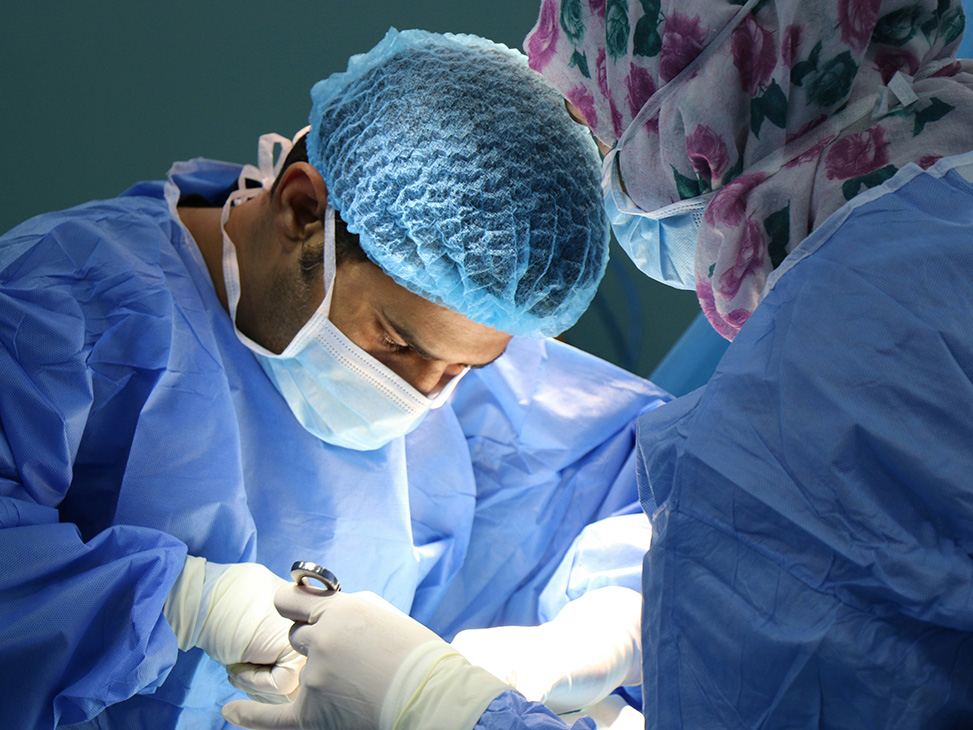Home / Surgical Solutions / Transgender Reconstruction Chest Surgery

Male to Female (MTF) and Male to Neutrois (MTN) Reconstruction Chest Surgery
MTF/N breast augmentation is a solution for transwomen or non-binary transgender people who wish to achieve a more feminine looking appearance through a surgical procedure that uses saline or silicone implants to enhance the size and shape of your chest. The ultimate goal of surgery is to make you feel more comfortable with your body by better aligning your physical characteristics with your internal sense of self and the self you’d like to present to the world. The relief surgery provides can enhance both your feelings of self-esteem and body confidence.
Choosing to undergo surgery is a complex process shaped by internal feelings and philosophies as well as by external circumstances such as your overall health, your ability to travel for surgery and your current financial status.
MTF breast augmentation carries all of the same risks associated with any surgical procedure. To ensure your risk of complications and side effects are low, it is important to possess good overall health in advance of MTF breast augmentation.
There are no definite weight restrictions for this procedure. However, patients who are overweight or obese will have a higher risk of complications and unfavourable results. If you are planning on losing a significant amount of weight, it’s recommended that you get closer to your ideal weight before undergoing breast surgery to enhance the final cosmetic result of your procedure.
If you’re a current smoker, this greatly compromises your body’s natural healing ability. You will be required to stop smoking at least three full weeks in advance of surgery (and another three weeks post-surgery). Smoking limits blood flow to the skin and triggers the release of skin-damaging free radicals which are likely to increase swelling and worsen scarring during recovery. The same rules apply to vape use.
To reduce your risk of complications and negative side effects, it’s essential that you disclose all of your medical history during your consultation. Hiding significant health problems (or current prescriptions) because you think they will prevent you from having the procedure will only hurt you and potentially place you at medical risks in the long run.
Though the following medical conditions won’t necessarily prevent you from being a good candidate for MTF breast augmentation, they may necessitate medical clearance from your regular physician:
MTF breast augmentation isn’t right for everyone. Prior to surgery, you will need to undergo a physical examination with our team as well as an in-depth discussion of your health history and cosmetic goals.
For your safety, it’s important to disclose all prescription and over-the-counter medications, dietary and herbal supplements and recreational drugs you have taken in the six months leading up to your surgical consultation. Certain drugs and supplements may have a negative impact on your surgery, and will need to be discontinued in advance. Our team will go over these restrictions with you at length.
Breast augmentation is a significant surgical procedure, which means that it will take time for your body to heal and recover. Most patients require at least a week of rest before resuming work and other low impact activities. While rigorous physical activities should be restricted for about six weeks, or until the medical team you the green light.
Bruising, swelling and some physical discomfort are common during these initial stages of recovery, and may affect breast sensation. However, these effects will gradually dissipate over the course of a few weeks. Once the nerves have fully recovered, the sensation in most patients’ breasts should return.
MTF breast augmentation can give you amazing results. However, it also poses some risks that can lead to complications or unfavorable results. Whether you’re undergoing a plastic surgery procedure or a routine surgical procedure, it’s important to remember that all surgeries carry risk.
Risks associated with all surgical procedures include: infection, bruising and swelling, changes in skin texture, fluid build-up, scars, and adverse reaction to anesthesia.
Overall, risks associated with plastic surgery are relatively small. The risk of experiencing a serious complication is less than half of one percent, while mortality risks are only 1 in 57,000 patients.
Generally speaking, your overall health (rather than age) is a much better indicator of your risk level. However, because older patients are at a higher risk of serious medical conditions, they may have higher risks. The best candidates for MTF breast augmentation are physically and emotionally healthy. You may not be a good candidate for surgery if you have any of the following conditions:
There are a number of things you can do to reduce your risk of complications before and after MTF breast augmentation. One of the most important ways to reduce risk is to select a surgeon who appears as a Specialist plastic & reconstructive surgeon on the GMC register for your procedure to ensure that your surgeon has extensive surgical training, has passed rigorous testing and is current on all of the latest surgical techniques and advances in patient safety.
Once you’ve selected a qualified surgeon for your procedure, it’s very important that you are honest and upfront about your medical history and cosmetic goals. From this information, your surgeon will be able to determine if you are healthy enough to undergo a major surgical procedure. This information will also help your surgeon determine if extra precautions are necessary during or after surgery.
MTF breast augmentation may not be for everyone. Your surgeon will be able to determine if surgery is right for you following a personal examination and consultation. It’s important to remember that high standards of patient care, safety and successful results are the product of the patient, the surgeon and the surgical staff working in tandem to give you the best results possible
Asymmetry is a common risk for anyone undergoing breast augmentation. The first thing you should do is consult with your surgeon to figure out what’s causing the asymmetry. In most cases, asymmetry is only temporary, but in rare instances it may be the result of a post-surgical complication.
Residual swelling can last for a month or longer following breast augmentation. Once swelling has subsided, your breast implants will begin to settle into a more natural position. They may, however, settle at different rates, resulting in a difference in appearance. Your breasts will gradually settle over the course of 3-4 months, but it may take up to 8 months before your final results are realized. Usually a surgeon will wait 6 months to a year to determine if a revision is necessary.
In some cases, breast asymmetry may be the result of a doctor or patient error. An unskilled or under-qualified surgeon could use improper techniques or even insert a poor choice of size for implants for your body.
In cases where asymmetry persists, revision surgery may be necessary to correct asymmetry or improve implant placement. Breast revision surgery should always be performed by a highly specialized surgeon. Revision surgery requires a lot of experience and skill to maximize predictability.
If you feel asymmetry is the result of doctor error, you may want to seek out the advice of a different plastic surgeon. Please check the GMC Specialist register to ensure your surgeon appears there as a Plastic & Reconstructive Specialist for cosmetic or reconstructive surgery.
While minor asymmetries are common, anything significant may signify a post-surgical complication and should be reported to your surgeon. Some of these causes of asymmetry include:
The goal of MTF breast augmentation is to create a more feminine-looking chest. Through the insertion of saline or silicone breast implants, your surgeon enhance the size and shape of your chest. Though it may be easy to get caught up in the aesthetic changes that result from breast augmentation, it’s important to remember that breast augmentation also may create changes in sensation.
In the weeks following breast augmentation, it’s normal to experience changes in sensation or numbness. For most patients, these changes are only temporary (but in some cases, may last for up to two years). However, it is possible that your nipples or lower breast tissue will permanently lose sensation – either partially or completely – following breast augmentation. The risk of permanent nipple numbness is about 15 %. If you feel that permanent nipple numbness would cause you to regret your decision to undergo breast augmentation, then it may not be the right procedure for you.
Additionally, the opposite outcome – amplified nipple sensation – is also possible following breast augmentation and can be somewhat uncomfortable. This post-surgical side effect is almost always temporary and usually resolves on its own within a few weeks.
MTF breast augmentation can do more than just transform your physical appearance; it can transform your self-esteem and body confidence. Following surgery, most patients report feeling more comfortable in their own skin and as a result, also report increased sexual satisfaction.
It is important to note that your body needs time to rest and recover followings surgery. This means that sexual activity (and most forms of intimacy), like all physical activity, should be avoided for at least six weeks
Scarring is an inevitable consequence of most surgical procedures, including MTF breast augmentation. Though most patients don’t experience significant scarring, it’s important to prepare yourself for the possibility. Scars from MTF breast augmentation develop along the incision line where the implants are inserted.
Scars form because of trauma to the skin. After a surgical incision, our bodies naturally produce a protein called collagen to repair the gap. Collagen is like the cement filling between two bricks. Though collagen is an essential part of the natural healing process, it often results in a noticeable scar. The more skin is damaged, the longer it will take to heal and the greater chance of significant scarring. Additional factors such as age, genetic factors, skin tone and location can affect the appearance of a scar.
The location and appearance of scars depends on the incision pattern used during surgery. Breast implants are typically placed through one of three incisions: along the border of the areola (periareolar), below the fold of the chest muscle (inframammary), or through the armpit (transaxillary). The best incision pattern for you will depend on several factors such as your body type, implant size and implant type, as well as your personal preference.
Scarring will be the most noticeable during the first few months of recovery. They will appear raised and hyper pigmented against the rest of your skin. Over the course of several months they will begin to fade and flatten. The final appearance of your scars may not be apparent for up to 18 months.
MTF/N breast augmentation can certainly enhance your self-esteem and body confidence. It’s also important to maintain realistic expectations throughout the consultation and surgical process. There are trade-offs and potential complications with nearly every surgical procedure.
Every patient is unique, so it’s not entirely possible to predict how your results will look and feel or if you will experience changes in sensation after surgery. It’s also important to remember that additional surgeries may be necessary to help you achieve a more feminine-looking chest and body.
The best way to ensure you are receiving the highest standard of care is to choose a reputable surgeon. All of our surgeons are Consultant level Plastic and Reconstructive surgeons with the training and expertise to ensure the safety and success of your surgery as well as a breadth of knowledge and experience working with the transgender community.
As with any major life decision, it’s normal to experience some fears and hesitations when coping with the idea of permanent change. Most people experience a range of emotions when weighing the benefits of surgery with the potential complications and side-effects. At our practice we provide you with in-depth information on MTF/N surgical techniques, recovery, safety and results so that you can make an informed decision.
The only way to determine if you are an ideal candidate for MTF breast augmentation is the schedule a consultation with our team. During your consultation, you will undergo a physical exam, and discuss important factors such as your current health and aesthetic goals.
Realistic expectations are key to patient satisfaction. Prior to surgery, it’s essential that you understand the full scope of your procedure, including the associated risks and benefits. Our team at Cosmedicare will cover these topics at length during your personal consultation, and most commonly invite you to attend second consult after you have had time to research and process the information provided.
Typically 6 -12 months
Most patients require at least a week of rest before resuming work and other low impact activities.
Generally, after 6 weeks you can begin to return to your exercise regime. If you have further questions or concerns let your patient coordinator know so we can help.
The procedure can be performed on an outpatient basis removing the need for an overnight stay in hospital.
There are several steps you can take to improve the appearance of scars following MTF breast augmentation. Our team provide you with a detailed list prior to your surgery. Lifestyle choices such as refraining from smoking and/or vape use and wearing sunscreen can improve your body’s natural healing response. Eating a diet high in protein, zinc and vitamin C has also been proven to accelerate healing.
Popular scar treatments include:
Before trying any of the methods listed above, it’s best to discuss these options with our team first as we will be able to determine which of the above methods will yield the best results for your scars and skin type.
If topical treatments aren’t enough to minimize scarring, other treatments may be able to provide you with significant improvements:
In the weeks following breast augmentation, it’s normal to experience changes in sensation or numbness. For most patients, these changes are only temporary (but in some cases, may last for up to two years). However, it is possible that your nipples or lower breast tissue will permanently lose sensation – either partially or completely – following breast augmentation.
Additionally, the opposite outcome – amplified nipple sensation – is also possible following breast augmentation and can be somewhat uncomfortable. This post-surgical side effect is almost always temporary and usually resolves on its own within a few weeks.
We understand that procedures like this are a deeply personal decision—and one that comes with many questions. At Cosmedicare, we believe in open, honest communication every step of the way. Thats’s why we’ve tailored FAQs for straightforward answers, helping you feel informed, confident, and fully supported.
Following surgery patients can expect some pain and discomfort, this can be managed with medication. Minor bruising, swelling and a numb sensation will likely affect the breasts and nipples within the first few weeks after your procedure.
Even though your sutures will still be dissolving our team can schedule a post operative wound check for 5-7 days post surgery. We are committed to providing you with excellent results to enhance both your feelings of self-esteem and body confidence.
As you heal and swelling goes down you will be able to start seeing the results. Your fuller, more voluptuous breasts will help give you a more feminine appearance to make you feel more comfortable with your body.
Cosmedicare’s surgical team consists of highly trained, GMC-registered specialist surgeons with expertise in cosmetic, reconstructive, and gender-affirming surgery. They bring decades of experience and a commitment to delivering personalised care and exceptional results.
Our team of expert surgeons provide personalised, safe surgical treatments across a full range of procedures. Every experience is tailored to your individual needs.

Choosing the right incision technique for chest masculinization surgery is a deeply personal decision—and one that depends on your anatomy,

FTM/N chest surgery is a life-changing procedure that requires careful planning and consideration in advance. Because FTM/N chest reconstruction is a

Whether you’re considering cosmetic surgery, weight loss surgery, or any surgical procedure — one of the most important decisions you’ll
Website by Creo Design, part of The Solutions on Demand Group